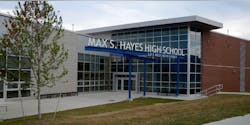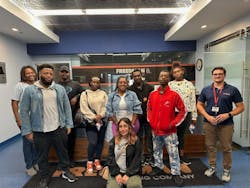Youth Need Jobs; Manufacturers Need Workers. How Do You Connect the Two?
Leaders of two respected manufacturing workforce organizations—Chicago’s Manufacturing Renaissance and Cleveland’s Manufacturing Works—joined Production Pulse host Jennifer Ramsay last week for a discussion of the value of building a workforce pipeline in underserved communities. They were joined by Jordan Hooser, the 2016 valedictorian of Max Hayes High School in Cleveland and a Marine Corp. veteran. Hooser recently completed a tool and die apprenticeship at WLS Stamping.
A decline in high school vocational programs created a mismatch between employers’ need for skilled workers and the young people who needed those jobs.
“We did research and saw that a lot of higher-paying, higher-quality jobs were going unfilled for weeks and months,” said Erica Staley, executive director of Manufacturing Renaissance.
“And in a place like Chicago, where the need for jobs is so acute, especially in certain neighborhoods like the West and South sides … we made the case to city leadership, to Chicago Public school leadership, ‘Hey, there is a real opportunity here to get more employers involved at the high school level.’”
In Cleveland, Manufacturing Works has had a presence at Max Hayes High School for more than 20 years. The students learn about different trades, have job shadowing opportunities, go on plant tours and even gain experience on the shop floor through a provision in state law for minors in career and technical education programs, said Beth Dawson, director of Manufacturing Works’ apprenticeship program.
“When you have the opportunity to have young people in your plant, it’s important to show them that you have a welcoming culture,” said Dawson. “Not just being open to having students, but really encouraging it. Especially in underserved communities—it’s important to show that you are prepared to welcome a diverse group. When students start in a work-based learning program, it’s critical that they have a good experience—because if they don’t, they’re not going to stick around in manufacturing.”
Students are looking for an environment where they are valued and the training is intentional, said Hooser. “This isn’t just a typical job we’re talking about,” he said. “This is something where you’re investing your time. And that investment is going to gradually pay off as you become a master in your craft.”
About the Author

Laura Putre
Senior Editor, IndustryWeek
As senior editor, Laura Putre works with IndustryWeek's editorial contributors and reports on leadership and the automotive industry as they relate to manufacturing. She joined IndustryWeek in 2015 as a staff writer covering workforce issues.
Prior to IndustryWeek, Laura reported on the healthcare industry and covered local news. She was the editor of the Chicago Journal and a staff writer for Cleveland Scene. Her national bylines include The Guardian, Slate, Pacific-Standard and The Root.
Laura was a National Press Foundation fellow in 2022.
Got a story idea? Reach out to Laura at [email protected]

